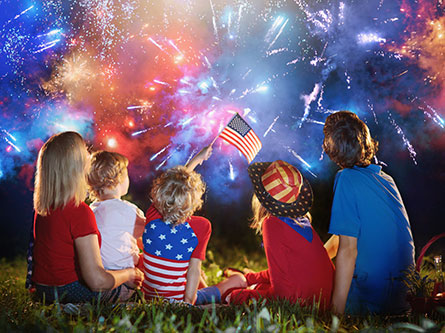For many, a fireworks show is a fun and festive way to celebrate the Fourth of July. However, all fireworks – legal or illegal – including sparklers, firecrackers and rockets pose risks of injury if not handled properly.
Hand, arm, eye and face injuries are quite common on and around this holiday. In 2024, more than 14,700 people were treated for fireworks-related injuries in emergency rooms, according to the U.S. Consumer Product Safety Commission.
If you live in a community where lighting off fireworks at home is legal, there is no foolproof safe way to use fireworks at home. It's far safer to enjoy fireworks organized by trained professionals, at a safe distance, instead of doing them at home.
Sign up for our Health Highlights e-newsletter
If you plan on lighting fireworks at home, here are 10 tips to keep you and your family safe:
Fireworks safety tips
- Buy only state fire marshal-approved fireworks, purchased from licensed fireworks stands.
- Fireworks should be lit one at a time. You should never point or throw them at people.
- Never allow young children to play with or ignite fireworks, including sparklers. Glow sticks, confetti poppers or colored streamers are great safe alternatives.
- Do not handle or allow someone to handle fireworks if they are under the influence of drugs or alcohol.
- Wear appropriate clothing. Avoid wearing loose clothes that can catch fire. Use protective eye gear when lighting or handling fireworks.
- Only use fireworks outdoors, away from dry vegetation and flammable materials.
- Do not alter fireworks or use homemade fireworks or illegal explosives.
- Never attempt to relight or handle "dud" fireworks. Soak them in water for 20 minutes and throw them away.
- After fireworks have burned, soak them with water from a bucket or hose to prevent trash fires. Then discard them.
- Keep a bucket of water or a garden hose nearby in case of fire or mishap.
Check out these summer food safety tips to keep your family healthy
What to do if you have a firework burn injury
Most firework-related injuries require medical assistance, but there are some steps you can take to reduce harm.
Learn about our emergency care for when you need it
For minor burns:
- Stop, drop, and roll or smother flames with a blanket.
- Apply cool (not ice-cold) water to the burn for five minutes or until the pain subsides.
For major burns:
- Call 911 for immediate medical help.
- Do not remove burned clothing.
- Avoid immersing large severe burns in cold water.
- Check for signs that the person is able to breath and move. If they aren't breathing, start CPR.
- Elevate the burned body part(s) if possible, raising them above heart level.
- Cover the person with a dry blanket to help prevent shock.
For blast injuries:
- All blast injuries require immediate medical attention. Call 911 right away so the person can be taken to the nearest emergency department.
Get information about our Emergency Department
This blog was medically reviewed by Christopher Bayne. He's an associate professor in the Department of Orthopaedic Surgery and an expert in hand, wrist, and arm repairs.




